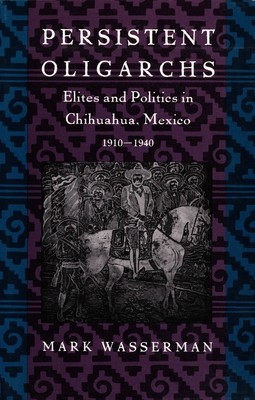
- We will send in 10–14 business days.
- Author: Mark Wasserman
- Publisher: Duke University Press
- ISBN-10: 0822313456
- ISBN-13: 9780822313458
- Format: 15 x 22.6 x 1.8 cm, minkšti viršeliai
- Language: English
- SAVE -10% with code: EXTRA
Reviews
Description
Did the Mexican Revolution do away with the ruling class of the old regime? Did a new ruling class rise to take the old one's place-and if so, what differences resulted? In this compelling study, the first of its kind, Mark Wasserman pursues these questions through an analysis of the history and politics of the northern Mexican state of Chihuahua from 1910 to 1940.
Chihuahua boasted one of the strongest pre-revolutionary elite networks, the Terrazas-Creel family. Wasserman describes this group's efforts to maintain its power after the Revolution, including its use of economic resources and intermarriage to forge partnerships with the new, revolutionary elite. Together, the old and new elites confronted a national government that sought to reestablish centralized control over the states and the masses. Wasserman shows how the revolutionary government and the popular classes, joined in opposition to the challenge of the elites, finally formalized into a national political party during the 1930s.
Persistent Oligarchs concludes with an account of the Revolution's ultimate outcome, largely accomplished by 1940: the national government gaining central control over politics, the popular classes obtaining land redistribution and higher wages, and regional elites, old and new, availing themselves of the great opportunities presented by economic development. A complex analysis of revolution as a vehicle for both continuity and change, this work is essential to an understanding of Mexico and Latin America, as well as revolutionary politics and history.
EXTRA 10 % discount with code: EXTRA
The promotion ends in 22d.00:04:55
The discount code is valid when purchasing from 10 €. Discounts do not stack.
- Author: Mark Wasserman
- Publisher: Duke University Press
- ISBN-10: 0822313456
- ISBN-13: 9780822313458
- Format: 15 x 22.6 x 1.8 cm, minkšti viršeliai
- Language: English English
Did the Mexican Revolution do away with the ruling class of the old regime? Did a new ruling class rise to take the old one's place-and if so, what differences resulted? In this compelling study, the first of its kind, Mark Wasserman pursues these questions through an analysis of the history and politics of the northern Mexican state of Chihuahua from 1910 to 1940.
Chihuahua boasted one of the strongest pre-revolutionary elite networks, the Terrazas-Creel family. Wasserman describes this group's efforts to maintain its power after the Revolution, including its use of economic resources and intermarriage to forge partnerships with the new, revolutionary elite. Together, the old and new elites confronted a national government that sought to reestablish centralized control over the states and the masses. Wasserman shows how the revolutionary government and the popular classes, joined in opposition to the challenge of the elites, finally formalized into a national political party during the 1930s.
Persistent Oligarchs concludes with an account of the Revolution's ultimate outcome, largely accomplished by 1940: the national government gaining central control over politics, the popular classes obtaining land redistribution and higher wages, and regional elites, old and new, availing themselves of the great opportunities presented by economic development. A complex analysis of revolution as a vehicle for both continuity and change, this work is essential to an understanding of Mexico and Latin America, as well as revolutionary politics and history.


Reviews